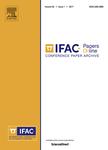版权所有:内蒙古大学图书馆 技术提供:维普资讯• 智图
内蒙古自治区呼和浩特市赛罕区大学西街235号 邮编: 010021

作者机构:Automatic Control Laboratory Department of Electrical Engineering and Information Technology ETH Zurich Switzerland Desautels Faculty of Management McGill University Montreal Canada
出 版 物:《IFAC-PapersOnLine》
年 卷 期:2017年第50卷第1期
页 面:14314-14319页
核心收录:
基 金:⋆⋆This research was partially funded by CTI within the SCCER ⋆This research was partially funded by CTI within the SCCERThis research was partially funded by CTI within the SCCER FEEB&D the Swiss National Science Foundation under the project FMEEESB&anDd the ESwTiHssZNuartiicohnFalouSncideantcieonF.oundation under the project IMES and the ETH Zurich Foundation. IMES and the ETH Zurich Foundation
主 题:Decentralized control Buildings Convex optimization Energy conservation Energy management Robust control Building energy managements Centralized optimization Computational effort Cooperative energies Distributed computations Limited communication Predictive control Robust controller synthesis
摘 要:Recent studies in the literature have shown that cooperative energy management of an aggregation of buildings may lead to substantial energy savings. These approaches typically assume the existence of a central operator that is capable of formulating and solving, within a reasonable amount of time, a centralized optimization problem. However, this requirement may be unrealizable in cases of large scale districts, and it also fails to address privacy concerns of the building occupants. In this paper, we deal with these issues by proposing a decentralized control scheme which only requires the individual buildings to communicate bounds on their energy demands. The proposed method partly alleviates concerns on privacy since this limited communication scheme does not reveal the exact characteristics of the energy usage within each building. In addition, it enables a distributed computation of the solution, making our method highly scalable. We demonstrate through a numerical study the efficacy of the proposed approach, which leads to solutions that closely approximate those obtained by the centralized formulation only at a fraction of the computational effort. © 2017